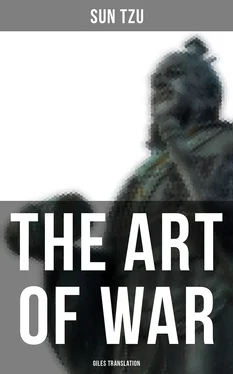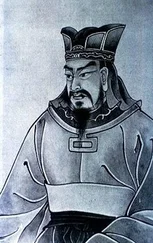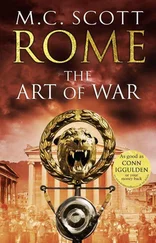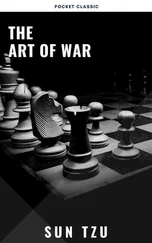Sun Tzu
THE ART OF WAR
(Giles Translation)
Published by

Books
- Advanced Digital Solutions & High-Quality eBook Formatting -
musaicumbooks@okpublishing.info
2017 OK Publishing
ISBN 978-80-272-3138-6
ORIGINAL TEXT
I. LAYING PLANS
II. WAGING WAR
III. ATTACK BY STRATAGEM
IV. TACTICAL DISPOSITIONS
V. ENERGY
VI. WEAK POINTS AND STRONG
VII. MANEUVERING
VIII. VARIATION IN TACTICS
IX. THE ARMY ON THE MARCH
X. TERRAIN
XI. THE NINE SITUATIONS
XII. THE ATTACK BY FIRE
XIII. THE USE OF SPIES
COMMENTED TEXT
INTRODUCTION
I. LAYING PLANS
II. WAGING WAR
III. ATTACK BY STRATAGEM
IV. TACTICAL DISPOSITIONS
V. ENERGY
VI. WEAK POINTS AND STRONG
VII. MANEUVERING
VIII. VARIATION IN TACTICS
IX. THE ARMY ON THE MARCH
X. TERRAIN
XI. THE NINE SITUATIONS
XII. THE ATTACK BY FIRE
XIII. THE USE OF SPIES
SUN TZU ON THE ART OF WAR
THE OLDEST MILITARY TREATISE IN THE WORLD
Translated from the Chinese with Introduction and Critical Notes BY
LIONEL GILES, M.A.
Assistant in the Department of Oriental Printed Books and MSS. in the British Museum First Published in 1910
—————————————————————————— To my brother
Captain Valentine Giles, R.G.
in the hope that
a work 2400 years old
may yet contain lessons worth consideration
by the soldier of today
this translation
is affectionately dedicated.
——————————————————————————
[This is the original text of Sun Tzu on the Art of War. It was extracted from Mr. Giles' complete work as titled above. The commentary itself - with Introduction and Critical Notes - which, of course also includes the original text embedded within it, follows at the second part of the book called COMMENTED TEXT]
TOC
TOC
1. Sun Tzu said: The art of war is of vital importance to the State.
2. It is a matter of life and death, a road either to safety or to ruin. Hence it is a subject of inquiry which can on no account be neglected.
3. The art of war, then, is governed by five constant factors, to be taken into account in one's deliberations, when seeking to determine the conditions obtaining in the field.
4. These are: (1) The Moral Law; (2) Heaven; (3) Earth; (4) The Commander; (5) Method and discipline.
5,6. The Moral Law causes the people to be in complete accord with their ruler, so that they will follow him regardless of their lives, undismayed by any danger.
7. Heaven signifies night and day, cold and heat, times and seasons.
8. Earth comprises distances, great and small; danger and security; open ground and narrow passes; the chances of life and death.
9. The Commander stands for the virtues of wisdom, sincerity, benevolence, courage and strictness.
10. By method and discipline are to be understood the marshaling of the army in its proper subdivisions, the graduations of rank among the officers, the maintenance of roads by which supplies may reach the army, and the control of military expenditure.
11. These five heads should be familiar to every general: he who knows them will be victorious; he who knows them not will fail.
12. Therefore, in your deliberations, when seeking to determine the military conditions, let them be made the basis of a comparison, in this wise:--
13. (1) Which of the two sovereigns is imbued with the Moral law?
(2) Which of the two generals has most ability?
(3) With whom lie the advantages derived from Heaven and Earth?
(4) On which side is discipline most rigorously enforced?
(5) Which army is stronger?
(6) On which side are officers and men more highly trained?
(7) In which army is there the greater constancy both in reward and punishment?
14. By means of these seven considerations I can forecast victory or defeat.
15. The general that hearkens to my counsel and acts upon it, will conquer: let such a one be retained in command! The general that hearkens not to my counsel nor acts upon it, will suffer defeat:--let such a one be dismissed!
16. While heading the profit of my counsel, avail yourself also of any helpful circumstances over and beyond the ordinary rules.
17. According as circumstances are favorable, one should modify one's plans.
18. All warfare is based on deception.
19. Hence, when able to attack, we must seem unable; when using our forces, we must seem inactive; when we are near, we must make the enemy believe we are far away; when far away, we must make him believe we are near.
20. Hold out baits to entice the enemy. Feign disorder, and crush him.
21. If he is secure at all points, be prepared for him. If he is in superior strength, evade him.
22. If your opponent is of choleric temper, seek to irritate him. Pretend to be weak, that he may grow arrogant.
23. If he is taking his ease, give him no rest. If his forces are united, separate them.
24. Attack him where he is unprepared, appear where you are not expected.
25. These military devices, leading to victory, must not be divulged beforehand.
26. Now the general who wins a battle makes many calculations in his temple ere the battle is fought. The general who loses a battle makes but few calculations beforehand. Thus do many calculations lead to victory, and few calculations to defeat: how much more no calculation at all! It is by attention to this point that I can foresee who is likely to win or lose.
TOC
1. Sun Tzu said: In the operations of war, where there are in the field a thousand swift chariots, as many heavy chariots, and a hundred thousand mail-clad soldiers, with provisions enough to carry them a thousand li, the expenditure at home and at the front, including entertainment of guests, small items such as glue and paint, and sums spent on chariots and armor, will reach the total of a thousand ounces of silver per day. Such is the cost of raising an army of 100,000 men.
2. When you engage in actual fighting, if victory is long in coming, then men's weapons will grow dull and their ardor will be damped. If you lay siege to a town, you will exhaust your strength.
3. Again, if the campaign is protracted, the resources of the State will not be equal to the strain.
4. Now, when your weapons are dulled, your ardor damped, your strength exhausted and your treasure spent, other chieftains will spring up to take advantage of your extremity. Then no man, however wise, will be able to avert the consequences that must ensue.
5. Thus, though we have heard of stupid haste in war, cleverness has never been seen associated with long delays.
6. There is no instance of a country having benefited from prolonged warfare.
7. It is only one who is thoroughly acquainted with the evils of war that can thoroughly understand the profitable way of carrying it on.
8. The skillful soldier does not raise a second levy, neither are his supply-wagons loaded more than twice.
9. Bring war material with you from home, but forage on the enemy. Thus the army will have food enough for its needs.
10. Poverty of the State exchequer causes an army to be maintained by contributions from a distance. Contributing to maintain an army at a distance causes the people to be impoverished.
Читать дальше













